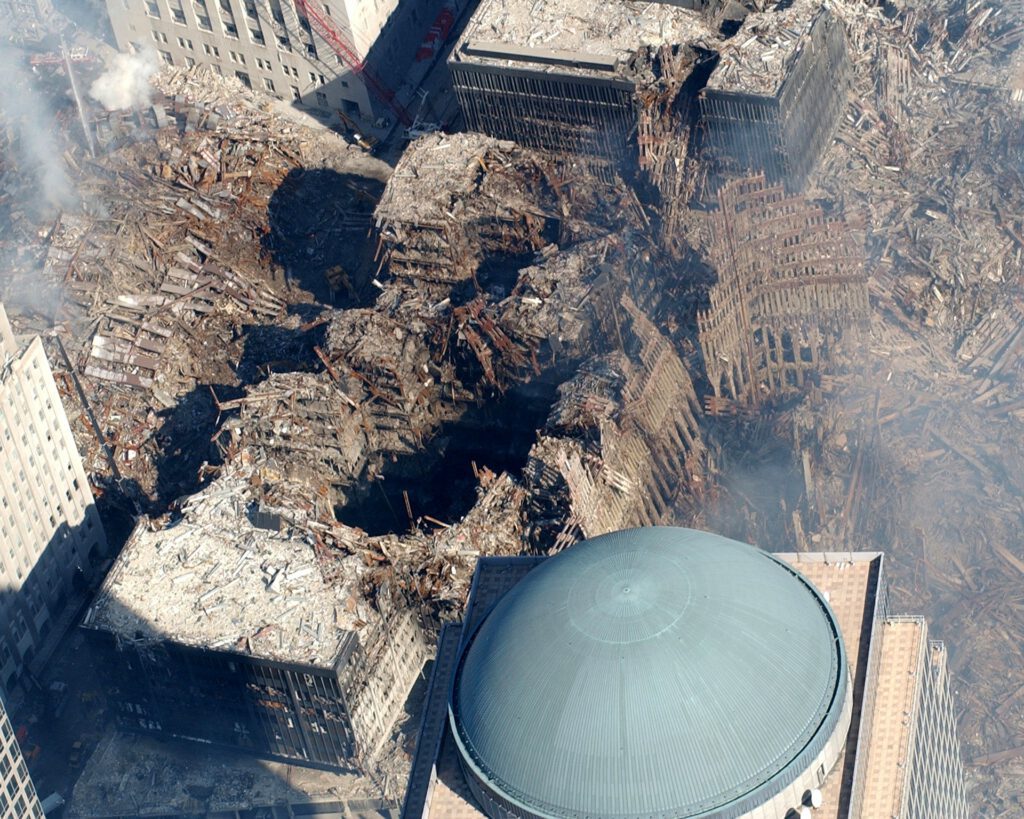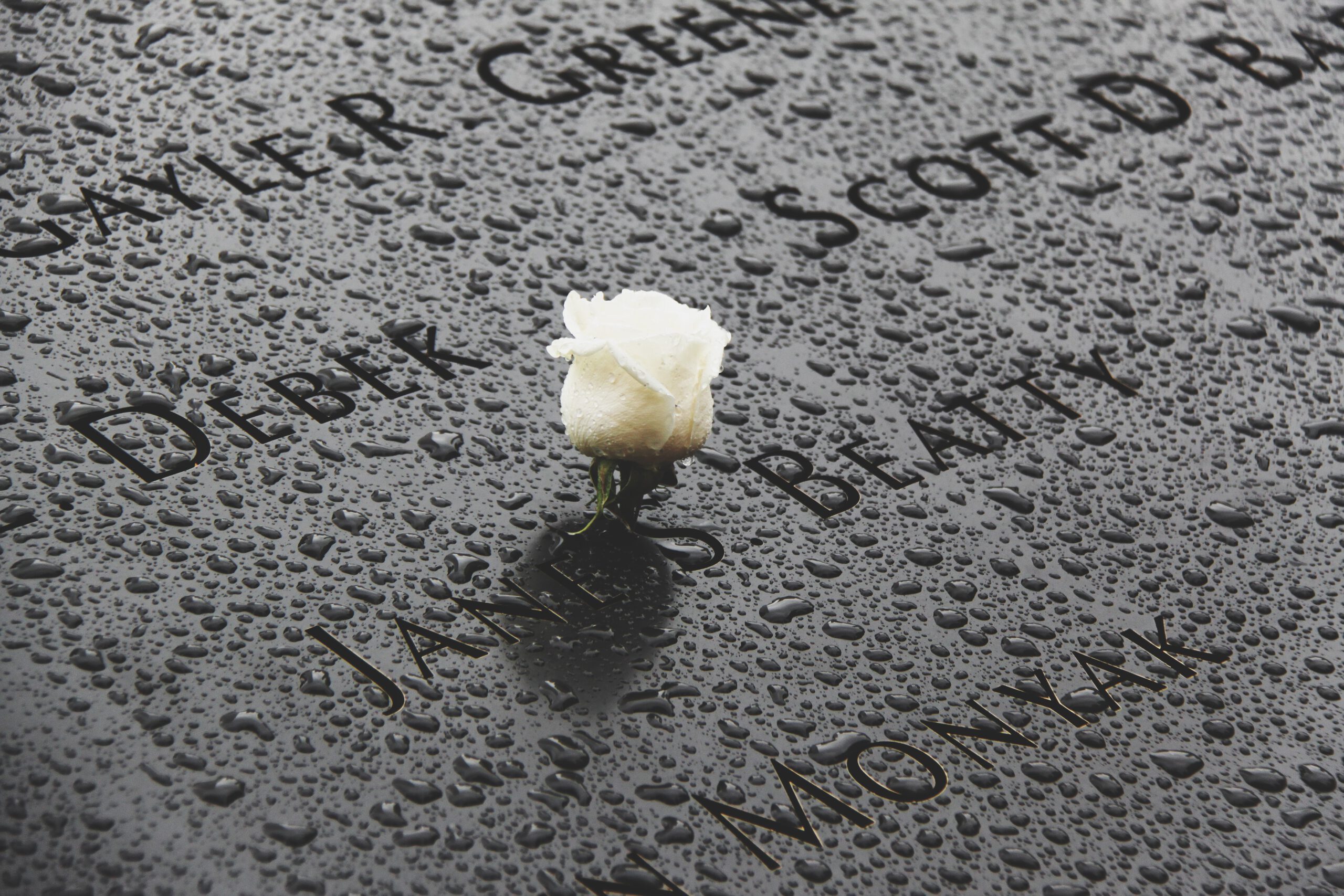Ten years ago in the aftermath of the attacks of September 11, 2001, amidst the rubble of the twin towers of the World Trade Centre, the smoking ruins of the Pentagon, and the wreckage of United Flight 93 in a Pennsylvania airfield, U.S. President George Bush famously divided the world into ‘us’ and ‘them’ in his statement, “Either you are with us, or you are with the terrorists.”1
‘Us’, according to Bush, was America, the West, Christendom, civilisation, and all who love freedom and democracy. ‘Them’ referred to Muslim extremists, terrorists of ‘Middle Eastern appearance’, Osama bin Laden, the mastermind of the attacks, and Al-Qaeda, the terrorist network that carried them out. ‘They’ had launched a devastating attack on America, causing the deaths of some 3,000 people. And so Bush’s declaration to a grieving nation newly live to its vulnerability efficiently, if crudely, drew a line in the sand and waited for the world to take sides: with us and against them.
The decade since 9/11 hasn’t dulled the shock of the attacks, the grief of the living, the intolerable waste of human life, and the injustice it all amounts to—which makes Bush’s ‘us’ and ‘them’ stance understandable. But events like 9/11 do more than make us want to live in a world without terror. They also make us want to live in a world without those who are other to us, whose differences of culture, language and ideology stir in us a curious mix of fascination and repulsion depending on whether we find those differences simply strange and quirky or something more sinister.

On 9/11, this latter otherness found brute expression in the terrorism of bin Laden and Al-Qaeda. While President Bush distinguished carefully between the terrorist-other (bin Laden and other “traitors to their own faith”) and moderate Muslims, his speech crystallised the threat that Muslim extremists posed to ‘us’ and demonstrated what was at stake in this fight: freedom and civilisation itself.2 Bush’s words projected a future that assumed our victory because of our goodness and moral superiority, and looked forward to the day a triumphant flag would be raised on a world purged of the murderous, barbaric ‘them’.
We got a glimpse of such a world on May 2, 2011: the day that U.S. Navy Seals executed Osama bin Laden and that ended a decade-long hunt for the fugitive leader of Al-Qaeda. American newspaper headlines ranged from triumphant—The Washington Post: “U.S. forces kill Osama bin Laden; Obama: Justice has been done’—to triumphalist—The New York Post: “Got him! Vengeance at last! U.S. nails the bastard.” These headlines served to reassure the American people that justice had been delivered, which could assist them to achieve a sense of closure after the traumatic events of 9/11.
Trouble is, the world of May 3 didn’t look all that different. In June, Ayman al-Zawahiri was confirmed as the new head of Al-Qaeda. In August, more than 31 American troops perished in a helicopter attack in Afghanistan, including 20 Navy Seals from the same team that carried out the raid on bin Laden’s compound. U.S. forces promptly retaliated, killing the Taliban insurgents responsible for the deadliest single incident for American troops in the decade-long war.
Tit for tat. The situation recalls the Greek myth where Heracles faces off against the many-headed hydra. Heracles may doggedly lop off the beast’s many heads but new ones keep sprouting from their stumps. The hero eventually kills the beast in the myth, but the ability for America (here playing Heracles) to eliminate this hydra (Al-Qaeda, Taliban insurgents, ‘terror’ itself) is far less certain.
In fact, as the decade since 9/11 has made clear, the spiral of violence in which Heracles and the hydra are both caught up doesn’t end but makes us all reapers of the whirlwind—including the ‘us’ we believe is just and pure, as well as the ‘them’ whom we believe is anything but.
The victims who died such awful, needless deaths in the devastation of 9/11 were innocent, and their loss bewilders even the best attempts to make sense of it. That hasn’t changed in the time since the attacks. However, the mounting death toll of those who belong to ‘us’ or ‘them’ sustained through the U.S.-led attacks on Afghanistan and Iraq in response to 9/11 reveals the costs of avenging those innocent deaths: the deaths of more innocents. Iraq Body Count, a website tracking non-combatant deaths in Iraq since the U.S. campaign began, officially numbers civilian deaths at over 100,000.
As soon as innocent victims retaliate against the evil done to them, they become its heirs.
That is why the Croatian theologian Miroslav Volf, of Yale University Divinity School, writes that innocence is simply not possible in a world of enmity: because “evil generates new evil as evildoers fashion victims in their own ugly image” (1996: 81). He means that as soon as innocent victims retaliate against the evil done to them, they become its heirs.
Such thinking is counterintuitive because victims, rightly, deserve restitution. They are, after all, the injured party. But if victims take up arms to deliver justice, will not other innocents invariably suffer—what of the injustice meted out to them? And how is justice to be kept from sliding into vengeance? What is the difference between the two?
The sociologist Zygmunt Bauman writes that “the world is full” (2002: 12) and that consequently, “in the end we must all be neighbours simply for having nowhere else to go” (2002: 14). Bauman’s definition of ‘neighbours’ is as full as the world he describes, for our neighbours are not only those we care for, or those who are within our immediate vicinity. He writes that our neighbours are also the (enemy?) others with whom we must live, though they may be as loathsome to us as Hercules might have found the hydra he was to slay.
Bauman’s world might be crowded, but it’s one in which it is possible to ‘make room’ for each other. This metaphor comes from Rowan Williams, the Archbishop of Canterbury, who writes about the way the doomed victims of Flight 93 ‘made room’ in their hearts for others by ringing their friends and family to bid them goodbye. While they called those they knew and loved, it is the act itself that interests Williams. He writes that ‘making room’ consists of a “language that brings into the world something other than self-defensiveness. It’s a breathing space in the asthmatic climate of self-concern and competition” (2002: 5).
Williams’ ‘breathing space’, then, consists of a pause that suspends judgement, resisting the urge to lash out despite provocation. It ‘makes room’ in one’s heart for others—not only those others who are known and loved, but perhaps also for those others not that close to us. And if such ‘making room’ is possible, then perhaps even more room can be made for those hostile others we call ‘them’, even though ‘they’ have hurt ‘us’.

These words aren’t easy to write. Ten years after the attacks, they are still likely to be heard as ‘unAmerican’, as ‘siding with the terrorists’. They feel like slaps in the face of those who have had no remains of their loved ones to lay to rest. The call to ‘make room’ for enemy others risks trivialising the immense sacrifices of fire fighters and police officers—many of whom perished while rescuing people from the burning towers. It also seems to disrespect the brave individuals who daily risk their lives in the ‘war on terror’.
That is not the intent of these words. Neither is the call to ‘make room’ a call to simply forget the past, to tally up the losses on both sides and call it even. Volf himself says that reconciliation is not possible without the truth being spoken and justice being served (1996: 29). These words are not even an appeal for the bereaved to forgive those enemy others who mercilessly killed their loved ones. But they seek to encourage an attitude that the wronged party can consider, or begin to consider, in relation to those who have hurt them. It’s an attitude of grace—undeserved, as all grace must be if it is to be worthy of its name.
While Williams calls this ‘making room’, Volf refers to such an attitude as ‘the will to embrace’, or “the will to give ourselves to others and ‘welcome’ them, to readjust our identities to make space for them” (1996: 29). This is the call to understand the other in all their difference and to see what life looks like from where they stand, and be willing to change our mind—not just about them but about ourselves and who we might be. The ‘will to embrace’ is an act of grace that we can extend to those who are different from us; indeed, everyone with whom we share the full world.
Perhaps Volf is right when he urges us to seek to embrace, rather than demonise, the other.
President Bush’s division of everyone into ‘us’ and ‘them’ is a monochrome world of good guys and bad guys. And that may have provided a sense of comfort for a time. But the consequences of that choice have reverberated ever since and the results haven’t made life safer for anyone.
Perhaps Volf is right when he urges us to seek to embrace, rather than demonise, the other. He says such an ethic lies at the heart of the Christian faith (1996: 85). At the core of that story is a god who lets himself be wounded and ultimately killed by those he calls enemies in the hope that one day he might call them his friends. The cross on which that god died, Volf says, reveals a god who “create[s] space in himself for the offender to come in” (1996: 126) and who entreats those who choose to follow him to do likewise.
Volf’s appeal to embrace rather than exclude the other, and his certainty that God expects no less of us, can’t help but cast in a less than favourable light the nation that proudly displays its Christian credentials while simultaneously hunting down its enemies. Or perhaps it’s simply the case that “America’s god is not the God that Christians worship” (Hauerwas 2011: online). Because unlike the former who cannot live with the hydra, the latter has offered to embrace it instead.
Dr Justine Toh is a Senior Research Fellow at the Centre for Public Christianity and an Honorary Associate of the Department of Media, Music and Cultural Studies at Macquarie University.
This article originally appeared in The Drum.
Footnotes
- Bush, George W. “Address to a joint session of Congress and the American people.” Address at the United States Capitol, Washington, D.C., September 20, 2001. http://www.whitehouse.gov/news/releases/2001/09/20010920-8html
- Ibid.